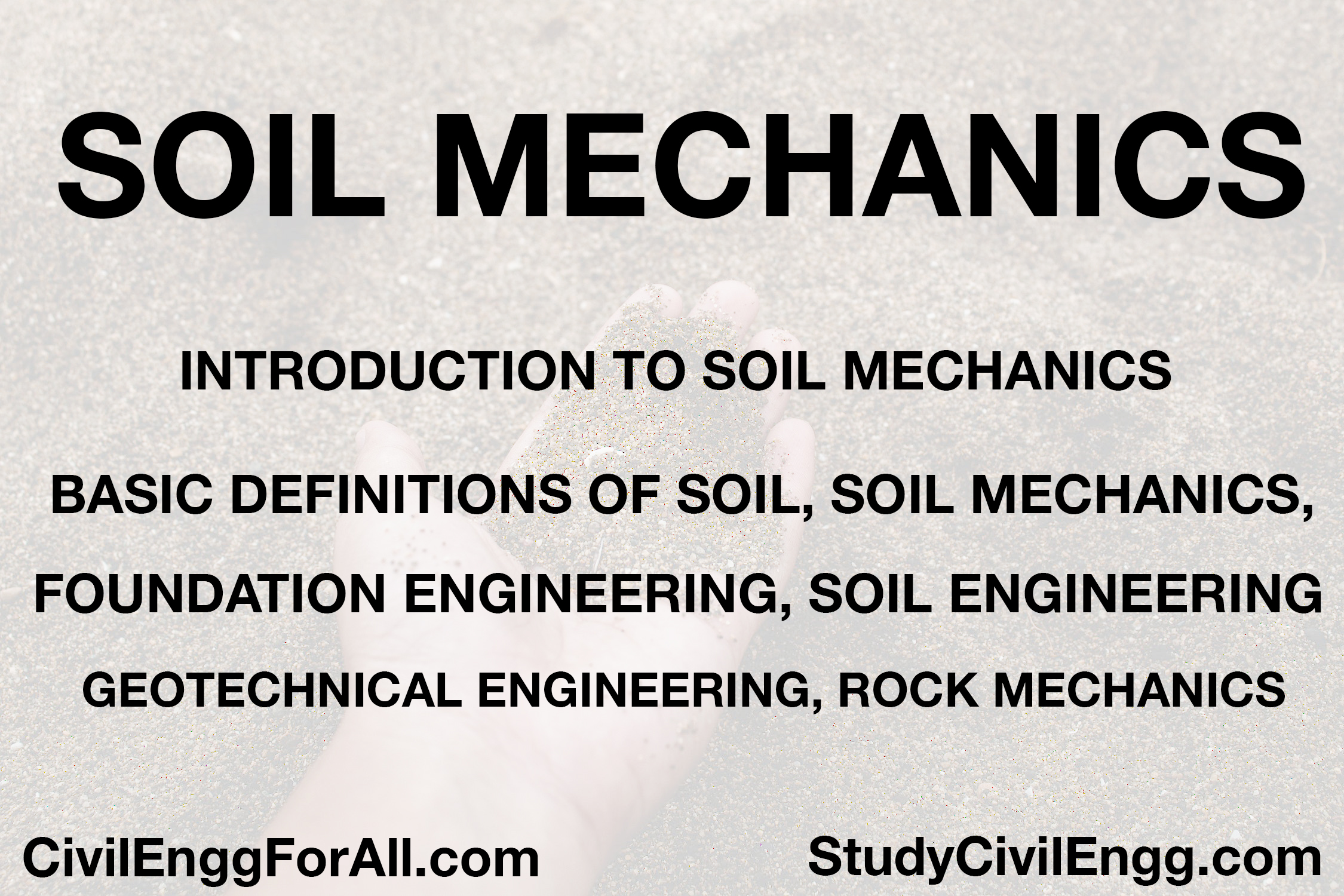INTRODUCTION TO SOIL MECHANICS AND BASIC DEFINITIONS (StudyCivilEngg.com)
INTRODUCTION TO SOIL MECHANICS
SUBJECT : SOIL MECHANICS
BASIC DEFINITIONS
WHAT IS SOIL?
Soil Definition - The term soil has been derived from the Latin word Solum. It has different meanings in different scientific fields. To an agricultural scientist soil means the loose material on the earth’s crust consisting of disintegrated rock with an admixture of organic matter, which supports plant life. To a geologist soil means the disintegrated rock material which has not been transported from the place of origin. To a civil engineer soil means loose unconsolidated inorganic material on the earth’s crust produced by the disintegration of rocks, overlying hard rock with or without organic matter. In general soil includes different materials like boulders, sands, gravels, clays, silts, etc., and the particle sizes in soil may range from grains only a fraction of a micron (m) (10–6 mm) in diameter to large size boulders.
WHAT IS SOIL MECHANICS?
The term Soil Mechanics was coined by Karl Von Terzaghi in 1925 when his book entitled Erdbaumechanik on the subject was published in German. According to Terzaghi, “Soil Mechanics is the application of the laws of mechanics and hydraulics to engineering problems dealing with sediments and other unconsolidated accumulations of solid particles produced by the mechanical and chemical disintegration of rocks regardless of whether or not they contain an admixture of organic constituents.” Thus soil mechanics is a branch of mechanics which deals with the behaviour of soil under the action of forces acting on the soil when it is used as a construction material or as a foundation material. The soil consists of discrete solid particles which are neither strongly bonded as in solids nor they are as free as particles of fluids. As such the behaviour of soils is somewhat in between that of solids and fluids. Soil mechanics is a relatively young discipline of Civil Engineering, systematised in its modern form by Karl Von Terzaghi, who is therefore rightly regarded as the ‘Father of Modern Soil Mechanics'
WHAT IS FOUNDATION ENGINEERING?
DEFINITION OF FOUNDATION ENGINEERING - Foundation Engineering is a branch of civil engineering which is associated with the design, construction, maintenance and renovation of various types of foundations such as footings, pile foundations, well foundations, caissons, etc., and all other structural members which form the foundations of buildings and other engineering structures. It involves the application of the principles of soil mechanics to the design and construction of foundations for various structures.
DEFINE SOIL ENGINEERING - Soil Engineering is an applied science which deals with the application of principles of soil mechanics to practical problems related with soils. It includes site investigations, design and construction of foundations, earth-retaining structures and earth structures. Thus soil engineering has a much wider scope than soil mechanics.
WHAT IS GEOTECHNICAL ENGINEERING?
Geotechnical Engineering includes both soil mechanics and foundation engineering. It is often used synonymously with soil engineering.
Until recently, the term ‘‘soil’ has been used in its broadest sense to include even the underlying bedrock in dealing with foundations. However, of late, it has been well-recognized that the engineering behaviour of rocks is quite different from that of soils. As such for studying the engineering behaviour of rocks a separate branch of science called Rock Mechanics has come up.
FAQs COVERED IN THIS BOOK
What is Soil?
Define Soil
What is Soil Mechanics?
What is the use of Soil Mechanics?
What is the definition of Soil Mechanics?
What is the definition of Soil Mechanics?
What is Foundation Engineering?
What is Soil Engineering?
Who is the father of Soil Mechanics?
Who introduced Soil mechanics?
What is Geotechnical Engineering?
What is meant by Rock Mechanics?
What is meant by Rock Mechanics?
ALSO READ
SURVEYING - STUDY ONLINE
BUILDING MATERIALS AND CONSTRUCTION - STUDY ONLINE
FLUID MECHANICS - STUDY ONLINE





Post a Comment